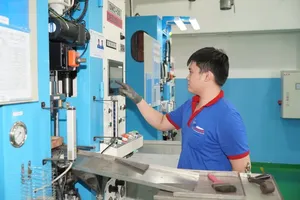 |
A customer is buying an item at Tan Phu AEon Mall (Photo: SGGP) |
According to financial experts, commercial banks and financial companies should pay attention to the consumer credit market in order to stimulate consumption demand in the context of the current weak purchasing power.
Statistics from specialized agencies show that credit growth in the first 4 months of 2023 was quite low, reaching only 3.04 percent. In order to stimulate consumer demand and push capital into the economy, many commercial banks have launched credit packages for consumer loans with reasonable interest rates.
Recently, the Prime Minister has directed the State Bank of Vietnam (SBV) to consider expanding those who can ask for consumer lending, which is considered as one of the solutions to promote growth and support production and business in the current difficult situation.
Specifically, SeABank has a consumer loan program to buy houses and cars with preferential interest rates of 9.29 percent per year. Vietcombank cooperated with Hyundai Thanh Cong Vietnam Automobile Company to implement a car loan program with interest rates from zero percent to 9.5 percent a year. Similarly, VPBank and Mitsubishi Motor Vietnam offered a car loan with a preferential interest rate of 8.8 percent a year with quick loan approval time.
Meanwhile, with a preferential credit package of VND13,500 billion, the interest rate is reduced by 4 percent compared to normal interest. In addition to lending to business households and micro enterprises, PVcomBank focuses on lending to individuals to buy houses to live in with priority being given to loans in apartment projects, individual houses, social housing, and houses for workers. To implement an effective loan package, PVcomBank has cooperated with social housing developers across the country to give borrowers pieces of advice on appropriate financial solutions.
Consumer credit in Vietnam currently accounts for a relatively large proportion, about 20 percent of the total credit balance (about 7 percent of Vietnam's GDP). Particularly, the branch of the State Bank of Vietnam (SBV) in Ho Chi Minh City said that the total outstanding consumer debt is now more than VND 933,000 billion, of which financial companies account for about VND104,000 billion.
On average, the growth of consumer loans in Ho Chi Minh City is about 36 percent per year. “If the population of Ho Chi Minh City is about 9.2 million people, on average, one person has access to about VND102 million”, said a representative of the branch of the SBV in Ho Chi Minh City
Developing loans through financial companies
Not only consumer loans through banks but also consumer loans through financial companies have satisfied people’s demand for capital, especially those who do not have access to credit capital from banks. However, in the past time, the nations economy was not good, many people lost their jobs and needed money to make ends meet so they got loans with very high interest rates.
According to banking and finance expert Nguyen Tri Hieu, Vietnam authorities regulated that consumer lending interest rates above 20 percent are illegal, but in fact, this situation still occurs. Currently, many financial companies lend loans with high interest rates up to more than 20 percent-30 percent a year. Even interest rates are up to several hundred percent in several pawn shops and loan shark rings. Many people borrowing money from black credit establishments cannot get out because they are unable to pay their huge debts.
Mr. Nguyen Hoang Minh, Chief Representative of the Vietnam Banks Association in Ho Chi Minh City, said that the State Bank has licensed 16 financial companies which operate under the Law on Credit Institutions. Meanwhile, there are illicit pawn shops and unlicensed loan applications (apps) causing people to misunderstand. Even many legal financial companies are thought to be as black credit establishments.
A representative of FeCredit said thatwhile the country is experiencing difficulties, consumer lending by financial companies is not very favorable, even more customers can’t pay back their personal loans.
According to data supplied by the Vietnam Bankers Association in Ho Chi Minh City,from 2016 to 2022, financial companies were growing by 19 percent-20 percent, accounting for 14 percent-15 percent of total outstanding loans, higher than the general growth rate. However, the lending and debt collection activities in the first quarter of 2023 of financial companies grew at a low rate because borrowers were slow to repay.
Mr. Nguyen Hoang Minh said that to help the consumer credit market grow again while preventing activities of black credit establishments, it is necessary to strengthen information to help customers understand that a licensed consumer finance company is legitimate.
At the same time, financial companies should continue to expand their networks, especially in export processing zones and industrial parks where many workers are working. Legal credit institutions need to facilitate workers' loan request. Moreover, these institutions should make the best use of technological applications for loan services and online payment in addition to reforms of administrative procedures so that people can easily access legal loans.
























